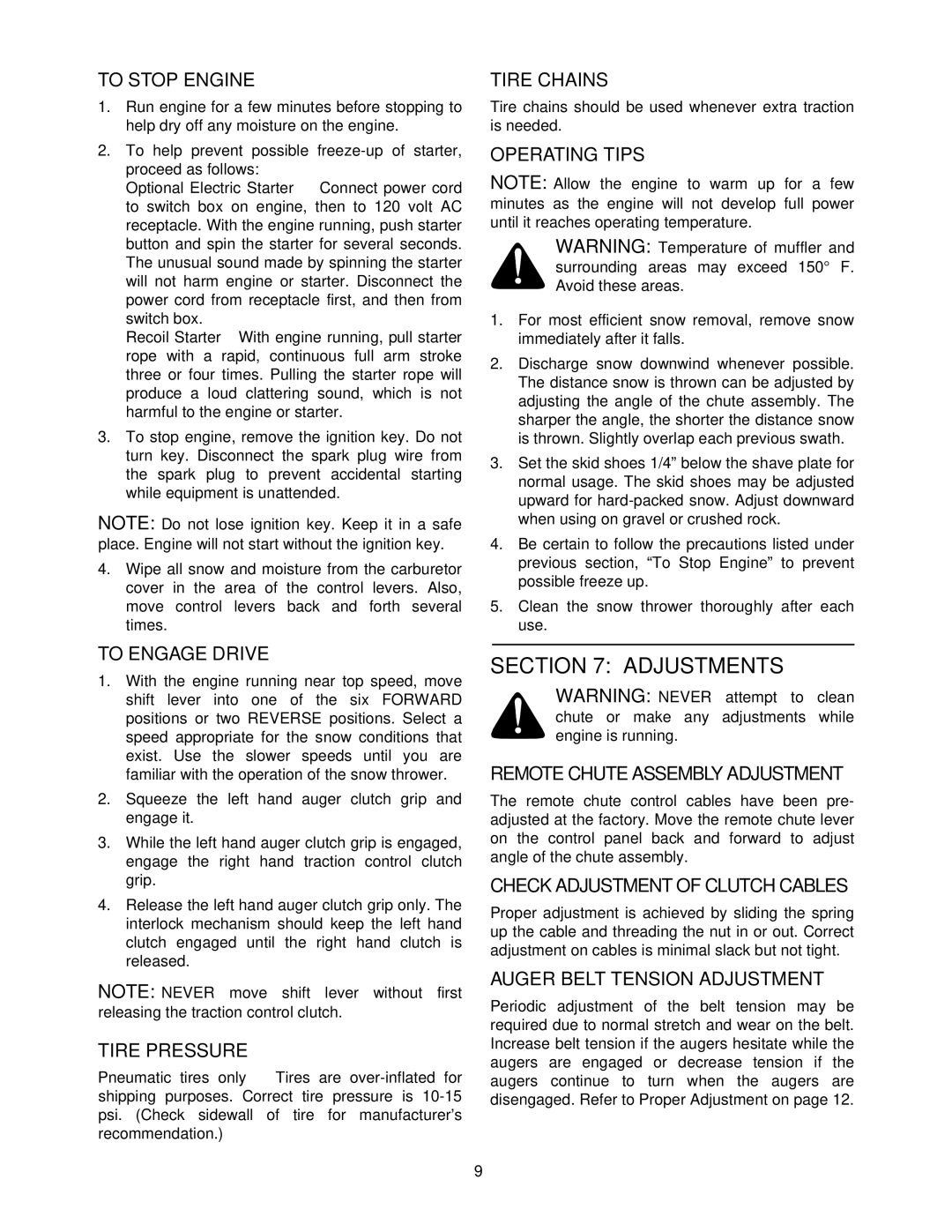
TO STOP ENGINE
1.Run engine for a few minutes before stopping to help dry off any moisture on the engine.
2.To help prevent possible
Optional Electric Starter Connect power cord to switch box on engine, then to 120 volt AC receptacle. With the engine running, push starter button and spin the starter for several seconds. The unusual sound made by spinning the starter will not harm engine or starter. Disconnect the power cord from receptacle first, and then from switch box.
Recoil Starter With engine running, pull starter rope with a rapid, continuous full arm stroke three or four times. Pulling the starter rope will produce a loud clattering sound, which is not harmful to the engine or starter.
3.To stop engine, remove the ignition key. Do not turn key. Disconnect the spark plug wire from the spark plug to prevent accidental starting while equipment is unattended.
NOTE: Do not lose ignition key. Keep it in a safe place. Engine will not start without the ignition key.
4.Wipe all snow and moisture from the carburetor cover in the area of the control levers. Also, move control levers back and forth several times.
TO ENGAGE DRIVE
1.With the engine running near top speed, move shift lever into one of the six FORWARD positions or two REVERSE positions. Select a speed appropriate for the snow conditions that exist. Use the slower speeds until you are familiar with the operation of the snow thrower.
2.Squeeze the left hand auger clutch grip and engage it.
3.While the left hand auger clutch grip is engaged, engage the right hand traction control clutch grip.
4.Release the left hand auger clutch grip only. The interlock mechanism should keep the left hand clutch engaged until the right hand clutch is released.
NOTE: NEVER move shift lever without first releasing the traction control clutch.
TIRE PRESSURE
Pneumatic tires only Tires are
TIRE CHAINS
Tire chains should be used whenever extra traction is needed.
OPERATING TIPS
NOTE: Allow the engine to warm up for a few minutes as the engine will not develop full power until it reaches operating temperature.
WARNING: Temperature of muffler and surrounding areas may exceed 150° F. Avoid these areas.
1.For most efficient snow removal, remove snow immediately after it falls.
2.Discharge snow downwind whenever possible. The distance snow is thrown can be adjusted by adjusting the angle of the chute assembly. The sharper the angle, the shorter the distance snow is thrown. Slightly overlap each previous swath.
3.Set the skid shoes 1/4” below the shave plate for normal usage. The skid shoes may be adjusted upward for
4.Be certain to follow the precautions listed under previous section, “To Stop Engine” to prevent possible freeze up.
5.Clean the snow thrower thoroughly after each use.
SECTION 7: ADJUSTMENTS
WARNING: NEVER attempt to clean chute or make any adjustments while engine is running.
REMOTE CHUTE ASSEMBLY ADJUSTMENT
The remote chute control cables have been pre- adjusted at the factory. Move the remote chute lever on the control panel back and forward to adjust angle of the chute assembly.
CHECK ADJUSTMENT OF CLUTCH CABLES
Proper adjustment is achieved by sliding the spring up the cable and threading the nut in or out. Correct adjustment on cables is minimal slack but not tight.
AUGER BELT TENSION ADJUSTMENT
Periodic adjustment of the belt tension may be required due to normal stretch and wear on the belt. Increase belt tension if the augers hesitate while the augers are engaged or decrease tension if the augers continue to turn when the augers are disengaged. Refer to Proper Adjustment on page 12.
9
